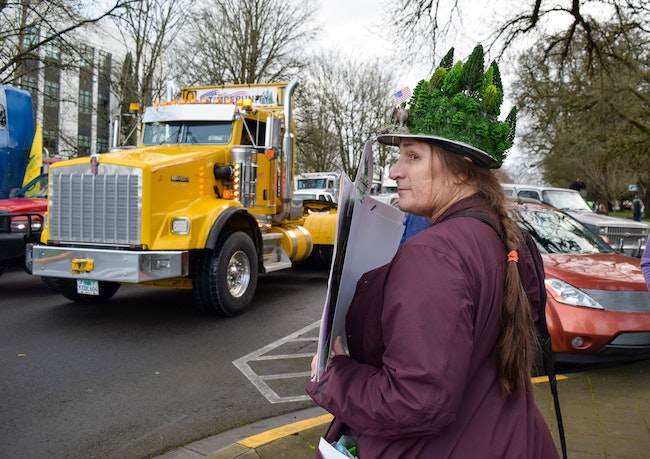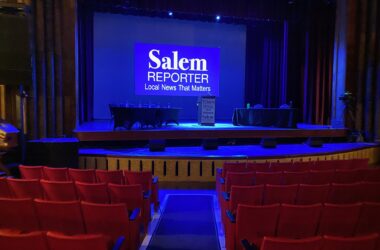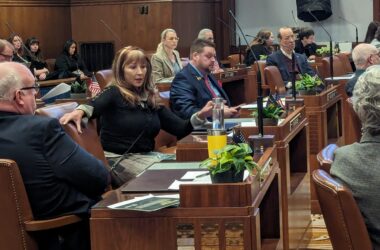
A woman holds a sign that reads: “Stop the climate change commies,” during a rally against cap and trade legislation. (Saphara Harrell/Salem Reporter)
SALEM — They are blue-collar workers but they carried views from the “red” parts of Oregon Thursday.
They were raising their voices in protest against legislative proposals they fear will cost them, their companies and their communities.
Some took time off from day jobs to travel to Salem to protest. Others were paid by employers to hit the road instead of tackling tasks back home in parts of the state.
The protest in Salem on Thursday, Feb. 6, reflected the deep political angst in rural Oregon about what Democrats and legislators intend to do in the next three weeks.
Primarily, they were there hoping to snuff out the latest plan at a carbon policy meant to limit greenhouse gas emissions in Oregon and fund a variety of environmental projects.
But they carried in their log trucks and dump trucks and service trucks other grievances.
Molly Welch, 60, a log truck driver from Cottage Grove, said she was in Salem because “I’m an Oregonian from day one.”
She said she grew up in Oregon, working in the woods throughout her life.
“And I’m just here hoping that we can get rid of Kate Brown and keep our state the way it should be….She’s against everything that we stand for in Oregon, I mean, this is tree country … farming, ranching. It’s a renewable resource.”
She gestured at the Capitol, and said “get rid of these people.” Although she supports President Donald Trump, she wants changes in Washington, D.C., too.
“We’ve been heading in the wrong direction for a long time,” Welch said.
Lewis Robertson, 63, is a machinist from Tualatin who took a day off from work to come to Salem. He said he was worried that “higher taxes” in cap and trade would affect him and costs for fuel would increase.
“The company that I work for, we use a lot of natural gas, and natural gas prices will go up. That’s going to harm the company that I work for in particular,” Robertson said.
Asked what brought him to Salem, Robertson said, “I’m here to support my fellow Oregonians. Born and raised in a small town here in Oregon, and it was all about logging back then, and you can see how much of it is gone, I mean, there are small communities along the Oregon coast that are barely surviving, because they don’t have the ability to go out, and do the type of work that they used to in the forests.”
Does he think the rally was only about cap and trade?
“No, I don’t,” he said. “I think it’s, there’s a lot of different issues that are going on within this whole rally…Well, I think a lot of people feel that you know, down the road, there are going to be more restrictions put on say, your ability to, just you know, guns and things of that nature. And I’ve also been a part of the recall Kate Brown, the last effort, which I won’t get involved in this time, I think it’s a waste of time…I think the energy went out of that the first time around.”
Paul Luhrs, of Albany, 48, works for a company that supplies fertilizer, mainly to big farms around the Willamette Valley.
He said he was there to support Timber Unity because if cap and trade “goes through, it affects me, everybody I know.”
“Well, everything that we have comes by truck or train,” Luhrs said. “Higher fuel costs, you know, a lot of our customers, farmers are barely making ends meet as it is, and extra cost is going to put them under.”
A logger from Lebanon, 36-year-old Jake Tacy, saw an effort by the state to take more of his money.
“Every time it seems like they meet here, they just want more of my money,” Tacy said. “I have to work pretty hard for a living. I’m tired of just giving it up. I don’t think that, when it comes to cap and trade, that that’s going to do anything that betters the environment. I mean…lots of people don’t understand the logging industry, don’t understand how we already take care of the land.
“If I had to pay a little bit more taxes to actually go toward something like making my pickup or equipment get better mileage, that would be different, but just to tax you, and then it’s not going to make less pollution because we have to do what we’re doing,” he said.
Matt, who would only give his first name, 34, said he does traffic control for a small Bend company that can’t afford to update its trucks to make them more fuel efficient.
“We drive a lot,” he said. “We drive all over the state. It’s gonna cause our fuel costs to skyrocket.”
He said he initially heard about the legislation from the “usual rumor mill.”
“And then I started looking into it, what they’re wanting to actually do, and it’s ridiculous, and not to mention the 15 other taxes,” Matt said. “Not an exact number, but they want to instate all these new taxes, you know, a real estate tax and everything. It’s going to create a system where people don’t want to invest in businesses here in Oregon, which is going to, you know, create unemployment.”
“It’s just a bad policy, all around,” he said. “I mean, you see hundreds of people here, if not a thousand or more. And I’m sure it’s going to grow throughout the day. You got to listen to the people and what the people want. You can’t just be a dictator.”
The Simon brothers of Malin once again joined Timber Unity’s display of trucks by bringing their hay and grain rigs to Salem. The Simons operate a farming and trucking business in southern Oregon bearing their family’s name. They covered their trucks in big blue tarps for demonstrators to sign their names and write short messages.
Ron Simon, 57, believes cap and trade is a threat to the family business because of what he expects to be increased fuel prices. Simon said it could potentially force him and wife Beth to retire early if the fuel prices put the cost of doing business out of their reach.
“We keep hearing about these amendments and exemptions, but in three or four years those exemptions could disappear, and then we’re stuck with the bill,” Simon said. “The government needs to start listening to its people or we need to get them out of here.”
Lawmakers say they have tempered their proposal to reduce the impact on rural and low-income Oregonians by creating a tax credit for low- and moderate-income people in areas where fuel importers will be subject to regulation in a separate bill, which also calls for refunds for off-road operations in agriculture and forestry. And the latest version of the main proposal would give free allowances to natural gas utilities to cover emissions specifically from low-income customers to prevent bill increases due to the program.
Simon believes the only way for Oregon to overcome the division between urban and rural residents is for Democratic lawmakers to spend more time meeting people in places like Malin.
In recent years, urban lawmakers have ventured beyond Salem, including an exchange program between urban and rural legislators and meetings in rural parts of the state. to take Oregonians’ ideas on a major bill to boost state money for schools.
Some demonstrators said they aren’t directly affected by cap and trade, but the potential loss of natural resource jobs makes them anxious about the economic viability of their hometown and region.
Elizabeth and Frank Wilkinson of Lyons are both retired, but they came out to support their neighbors and all Oregonians struggling to make ends meet in the natural resources sector.
“These jobs are important to manufacturing,” Elizabeth Wilkinson said. “If either of the mills near where I live — Frank Lumber in Mill City and Freres Mills in Lyons — shut down, that will devastate our communities. We’re already economically fragile in the North Santiam canyon.”
Wilkinson was a lead organizer in the failed recall effort against Brown. She says she’ll pick up the effort once more after the legislative session.
“This isn’t just about cap and trade. It’s about restricting gun rights, it’s about abuse of the short session, it’s about agenda-driven judicial appointments,” she said. “It’s a whole lot of things.”
 Timber Unity’s rally on Thursday, Feb. 6, brought more than 1,000 people to Salem. (Jaime Valdez/Pamplin Media)
Timber Unity’s rally on Thursday, Feb. 6, brought more than 1,000 people to Salem. (Jaime Valdez/Pamplin Media)
 Timber Unity’s rally on Thursday, Feb. 6, brought more than 1,000 people to Salem. (Jaime Valdez/Pamplin Media)
Timber Unity’s rally on Thursday, Feb. 6, brought more than 1,000 people to Salem. (Jaime Valdez/Pamplin Media)
 Timber Unity’s rally on Thursday, Feb. 6, brought more than 1,000 people to Salem. (Jaime Valdez/Pamplin Media)
Timber Unity’s rally on Thursday, Feb. 6, brought more than 1,000 people to Salem. (Jaime Valdez/Pamplin Media)
 Timber Unity’s rally on Thursday, Feb. 6, brought more than 1,000 people to Salem. (Jaime Valdez/Pamplin Media)
Timber Unity’s rally on Thursday, Feb. 6, brought more than 1,000 people to Salem. (Jaime Valdez/Pamplin Media)
Contact Reporter Sam Stites: [email protected] or 971-255-2480.
Contact reporter Claire Withycombe: [email protected] or 971-304-4148.
RELATED COVERAGE
PHOTOS: Loggers, truckers, farmers and more head to Capitol, seeking to spike carbon policy plans









